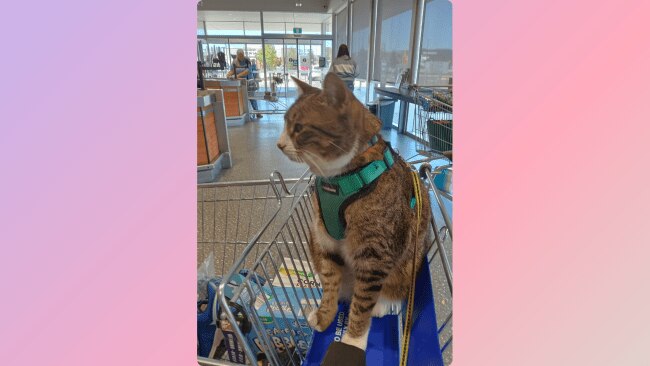Woman's unusual discovery in ALDI divides shoppers
“Yuck, I don't believe animals should be allowed in our trolleys where we put our food,” one person claimed. But others encouraged people to show more "compassion and understanding."
Lifestyle
Don't miss out on the headlines from Lifestyle. Followed categories will be added to My News.
A shopper was on her regular ALDI run in Jerrabomberra, ACT, when she spotted a cat nestled in a shopping trolley.
At first glance, the sight was unusual, to say the least. But upon closer inspection, she realised that it was an assistance pet, which is an animal trained to accompany a person with a disability or a mental health condition.
After snapping a photo of the cute companion, the woman shared a post to the ALDI fans Australia Facebook group, writing, “Here is something that is rare to see in an ALDI store.
“It is the first time I have ever seen an assistance cat anywhere in public.”
Want to join the family? Sign up to our Kidspot newsletter for more stories like this.

RELATED: Mum’s epic solution to the after-school snack frenzy
"What sort of 'assistance' does a cat offer?"
The poster probably didn’t mean to spark debate but that didn’t stop people from airing their concerns in the comments, from hygiene to allergies.
First, there was the question of necessity. “How does a cat assist in any way? They only want you when you have the cat food out,” one user wrote.
Another asked, “What sort of ‘assistance’ does a cat offer? I have cats myself, seems they need to up their game.”
“Does it grab things off the shelves for you?” quipped another.
According to the Commonwealth Disability Discrimination Act, an assistance pet can be any animal, provided it is trained and accredited under a State or Territory law to assist a person with a disability or by an animal training organisation.
So while uncommon, assistant cats do exist and their roles are usually to offer emotional support to people with PTSD or anxiety, reducing stress and even alerting their owners to potential mental health episodes.
"How unhygienic"
Secondly, hygiene was another concern raised by group members, given the nature of the products sold at supermarkets.
“Yuck, assistance or not. I don't believe animals should be allowed in our trolleys where we put our food,” one person claimed.
And someone else said, “Get that animal out of the food trolley!”
“How unhygienic to have a cat in a food supermarket,” a third wrote.
The Disability Act also requests that owners must prove that their animal “meet standards of hygiene and behaviour that are appropriate for an animal in a public place,” to get them accredited.
RELATED: Food hack to clean your shoes in seconds
"My kids have severe allergies"
Thirdly, people were concerned about allergy risks, with one person saying, “As someone who is contact allergic to cats and dogs, I really hope you clean the trolley well after putting your animal in there.”
“Same,” someone else agreed. “But I’ve never seen anyone take a pet out and clean the trolley.”
“My kids would be in trouble if they sat there after this cat! They have severe allergies,” a mum shared.
However other commenters replied, saying that the onus is on the allergic person to take those precautions, especially in public places.
“You should be wiping down the trolley if you or your family have severe allergies,” someone said.
And another added, “Most food is packaged and you should wash it anyway.”
"Show compassion and mind our own business"
Among all the criticism, some people highlighted the importance of assistance animals and emphasised how helpful they can be to people, especially in doing everyday tasks like grocery shopping.
“Honestly, I feel if someone’s mental health feels the need for companionship, show compassion and mind our own business,” wrote one.
Another urged people to not “ make fun of someone who needs this.”
“I don’t see an issue. If it’s helping a person deal with their life, then that’s all that matters,” a third wrote.
ALDI's store policy is guided by the legislation outlined in the Disability Discrimination Act 1992.
As per this legislation, a person must be able to produce evidence that the animal is an assistance animal and evidence that the animal is trained to meet standards of hygiene and behaviour that are appropriate for an animal in a public space.
How to be more understanding and show support to people with assistance animals
It’s clear there needs to be more education around assistance animals in Australia.
Access Link, a disability accessibility agency, is at the forefront of championing inclusion for people with assistance pets.
Here are some of their tips on how to show more understanding and support:
- Get familiar with the laws and policies surrounding assistance pets
- Understand that assistance is not just for the blind and visually impaired - these animals can be used for a range of physical, psychiatric and mental health issues
- Understand that invisible disabilities exist, so you might not be able to immediately identify someone’s need for assistance
- If you own a business, ensure you’re creating an inclusive environment by educating staff about relevant laws, providing accessible spaces and areas for people with assistance animals, offering reasonable adjustments to services or facilities when necessary and responding promptly to any complaints regarding discrimination.
More Coverage
Originally published as Woman's unusual discovery in ALDI divides shoppers




